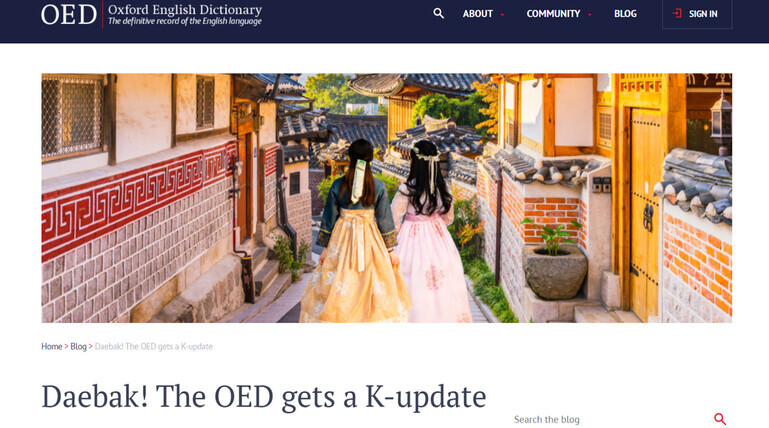hankyoreh
Links to other country sites 다른 나라 사이트 링크
‘Unni, fighting!’ Oxford English Dictionary adds 26 Korean words

The Oxford English Dictionary has added the Korean words "daebak," "mukbang," "kimbap" and many more to its latest edition.
The global successes of Korean productions like the Netflix series "Squid Game," the Oscar-winning film "Parasite" (2019) and K-pop juggernaut BTS have helped expose English speakers around the world to Korean.
The dictionary's website said on Wednesday that the latest edition of the reference book had added 26 Korean words, with quite a few being related to food. It defined "banchan" as "a small side dish of vegetables, served along with rice as part of a typical Korean meal," and "kimbap" as "a Korean dish consisting of cooked rice and other ingredients wrapped in a sheet of seaweed and cut into bite-sized slices."
Other food terms debuting in the dictionary were "bulgogi" (stir-fried marinated beef), "dongchimi" (a type of kimchi made with radish), "galbi" (a dish of beef short ribs, typically marinated), "japchae" (stir-fried cellophane noodles and vegetables) and "samgyeopsal" (pork belly typically grilled by the diner).
In addition to food terms, words related to Korean pop culture that has taken the world by storm were also introduced. "Hallyu" was defined as "the increase in international interest in South Korea and its popular culture, esp. as represented by the global success of South Korean music, film, television, fashion, and food"; "manhwa" as the “Korean genre of cartoons and comic books”; "mukbang" as "a video featuring a person eating a large quantity of food and talking to the audience"; and "daebak" as "an interjection expressing enthusiastic approval used in a similar way to 'fantastic!' and 'amazing!'"
The dictionary's website said "Korean style" displayed through hallyu as represented by K-pop, K-dramas and K-food "is now seen as the epitome of cool. We are all riding the crest of the Korean wave."
Select Korean words such as "oppa" and "unni" have seen changes in meaning as their use spread outside Korea, the dictionary said.
In Korea, "oppa" is typically used by a girl or woman to refer to an older brother, older male friend, or romantic partner who is a man, but in Southeast Asia, it is used to signify an attractive Korean man, especially a famous actor or singer.
As for "unni" — a word used typically by girls and women to address an older sister or older friend who is a woman, sometimes spelled as eonni — in Southeast Asia, it is used to refer to Korean actresses or singers who are women, and can be used by anyone, regardless of gender.
On the inclusion of Korean words, the dictionary said, "The adoption and development of these Korean words in English also demonstrate how lexical innovation is no longer confined to the traditional centres of English in the United Kingdom and the United States — they show how Asians in different parts of the continent invent and exchange words within their own local contexts, then introduce these words to the rest of the English-speaking world, thus allowing the Korean wave to continue to ripple on the sea of English words."
To research the inclusion of the terms, the dictionary’s editors took part in academic seminars on Korean and participated in workshops and various exchanges with Korea-based institutions like the National Institute of Korean Language, National Library of Korea and Korea University.
By Park Byong-su, senior staff writer
Please direct questions or comments to [english@hani.co.kr]

Editorial・opinion
![[Column] Season 2 of special prosecutor probe may be coming to Korea soon [Column] Season 2 of special prosecutor probe may be coming to Korea soon](https://flexible.img.hani.co.kr/flexible/normal/500/300/imgdb/original/2024/0426/3317141030699447.jpg) [Column] Season 2 of special prosecutor probe may be coming to Korea soon
[Column] Season 2 of special prosecutor probe may be coming to Korea soon![[Column] Park Geun-hye déjà vu in Yoon Suk-yeol [Column] Park Geun-hye déjà vu in Yoon Suk-yeol](https://flexible.img.hani.co.kr/flexible/normal/500/300/imgdb/original/2024/0424/651713945113788.jpg) [Column] Park Geun-hye déjà vu in Yoon Suk-yeol
[Column] Park Geun-hye déjà vu in Yoon Suk-yeol- [Editorial] New weight of N. Korea’s nuclear threats makes dialogue all the more urgent
- [Guest essay] The real reason Korea’s new right wants to dub Rhee a founding father
- [Column] ‘Choson’: Is it time we start referring to N. Korea in its own terms?
- [Editorial] Japan’s rewriting of history with Korea has gone too far
- [Column] The president’s questionable capacity for dialogue
- [Column] Are chaebol firms just pizza pies for families to divvy up as they please?
- [Column] Has Korea, too, crossed the Rubicon on China?
- [Correspondent’s column] In Japan’s alliance with US, echoes of its past alliances with UK
Most viewed articles
- 1‘We must say no’: Seoul defense chief on Korean, USFK involvement in hypothetical Taiwan crisis
- 2Why Kim Jong-un is scrapping the term ‘Day of the Sun’ and toning down fanfare for predecessors
- 3Two factors that’ll decide if Korea’s economy keeps on its upward trend
- 4BTS says it wants to continue to “speak out against anti-Asian hate”
- 5After election rout, Yoon’s left with 3 choices for dealing with the opposition
- 6Gangnam murderer says he killed “because women have always ignored me”
- 7South Korea officially an aged society just 17 years after becoming aging society
- 8AI is catching up with humans at a ‘shocking’ rate
- 9Ethnic Koreans in Japan's Utoro village wait for Seoul's help
- 1046% of cases of violence against women in Korea perpetrated by intimate partner, study finds